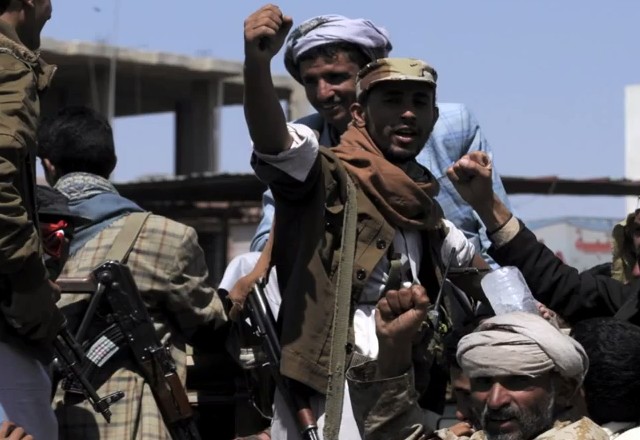Competing Narratives Add to Chaos in Yemen
Iran Postures as Yemeni Ground Conflict Rages

Earlier this month, officials with the United Nations had a delicate situation on their hands. The situation in Yemen was spiraling, and their best laid plans were quickly being turned to rubble as Saudi coalition airstrikes smashed through key territory in an effort to protect strategic port cities from the advance of Iranian-backed Houthi rebels.
The international community was concerned. For both Saudi and Iran, the airstrikes represented a turning point in discussions that had spiraled from tense to impossible; the UN fired (he “resigned,” officially) envoy and Moroccan diplomat Jamal Benomar, citing his apparent inability to get the warring factions to play nicely, and doubled down on the diplomacy narrative as world leaders began to express impatience with the bloodshed.
Benomar has now opened up to the media, accusing Saudi of derailing an impending peace deal in Yemen and solidifying already-stubborn positions on who should be involved in Yemen’s democratic political process.
From the Wall Street Journal:
“When this campaign started, one thing that was significant but went unnoticed is that the Yemenis were close to a deal that would institute power-sharing with all sides, including the Houthis,” said Mr. Benomar, a Moroccan diplomat.
…
“A very detailed agreement was being worked out, but there was one important issue on which there was no agreement, and that was what to do with the presidency,” Mr. Benomar said. “We were under no illusion that implementation of this would be easy.”Two other Arab states—Qatar and Morocco—were willing to host new rounds of Yemen peace talks. But after both countries joined the Saudi-led military coalition, the Houthis rejected those venues, according to Mr. Benomar.
President Hadi has suggested that talks resume in the Saudi capital of Riyadh under Saudi auspices. But that was a non-starter for the Houthis.
A senior diplomat familiar with the negotiations said the Saudis also intervened to prevent a power-sharing deal that would include the Houthis and that would give 30 % of the cabinet and parliament to women.
These “power-sharing” deals were contentious issues on multiple levels—not just when it came to gender. Both the Saudi and western-backed (and deposed) Hadi governments opposed the inclusion of Houthi interests, while the Houthi felt that many of the proposals Benomar offered marginalized their interests.
“Non-starters” abound in this region; the commencement of airstrikes aren’t 100% to blame for that.
Meanwhile, Iran is pitching a fit over the return of airstrikes against the Houthi advance, saying that the return of hostilities is proof that Iran’s influence is growing:
A Saudi-led coalition of Sunni Arab states launched air strikes in Yemen on March 26 against Huthi Shiite rebels, whom Riyadh accuses Tehran of arming.
“Now that these attacks have taken place, reservations should be put aside,” said General Mohammad Ali Jafari, head of Iran’s elite Guards force.
“Today the Saudi dynasty is on the verge of decline and fall,” he said, asserting that Iran was in the ascendancy, the official IRNA news agency quoted him as saying.
“We hope this will be realised quickly,” he added, according to the Tasnim news agency.
“Every day we are witnessing the strengthening of the Islamic revolution’s power and dimensions outside. Enemies and America have submitted to it.”
Tensions between Tehran and Riyadh are nothing new, but it’s certainly not helping. By dragging Israel into this, and emphasizing the power of the “Islamic revolution” as opposed to maintaining its interests in strategically-important Yemen (isn’t that what all this is about? Wait…) it signals to the rest of the world that this conflict isn’t just about one country, or the Arabian peninsula.
They’re daring us.
Whether we’re dealing with Israel, or Yemen, Iran is ready to make it clear that when it comes to territory and influence, anything less than full cooperation will not be tolerated. Their rebels took over the majority of a foreign country, deposed a democratic government, and is now demanding a seat at the table for discussions on how to clean up the mess.
What we’re seeing now from Tehran is a weaving-together of the narratives they’ve been vomiting for years—and we’re not going to see it let up any time soon.
Saudi airstrikes resumed this weekend. We’ll keep you updated on developments in the region, and on the UN’s position, as they become available.
 DONATE
DONATE
Donations tax deductible
to the full extent allowed by law.








Comments
But Iran didn’t call President Obama’s bluff.
When he sent warships to area, their ships, would were probably going to Yemen to deliver weapons to the Houthis, turned back.
And Saudi Arabis stopped its airstrikes – and then started it again. Perhaps they took U.S. military adviice that they were not hitting good targets.
More coming up on that, also how the UN is trying to push the narrative in a different direction.